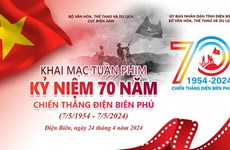RoK professor in love with Vietnamese literature
A RoK professor has worked for years to boost relations between his country and
Vietnam, doing translations of prominent Vietnam literary works, especially
President Ho Chi Minh’s Prison Diary.
A RoK professor has worked for years to boost relations between his country and
Vietnam, doing translations of prominent Vietnam literary works, especially
President Ho Chi Minh’s Prison Diary.
Ahn Kyong Hwan, currently Head of the Faculty of Vietnamese Studies in Chosun University in Gwangju, translated 133 poems from President Ho Chi Minh’s Prison Diary in 2002, which will be republished for the sixth time in March this year.
“I did not know much about President Ho Chi Minh before immersing myself into translating his poems,” the professor said in talks with the Hanoi Moi newspaper on the sidelines of an international conference introducing Vietnamese literature in Hanoi .
He said the translation helped him to gain an understanding of the beloved Vietnamese President’ life and works, as well as his sharp wit, intelligence and poetic nature.
“I love President Ho Chi Minh and feel very proud that Asia has a great poet such as him,” said Ahn.
On becoming enthusiastic about the Vietnamese language at the Korean Foreign Language University in 1974, Ahn then had the chance to study the language in Ho Chi Minh City when he worked for the Hyundai group.
He gained a MA in Vietnamese at HCM City ’s Social Science and Humanity University in 1993 and took a doctorate in the field at the university in 1996.
In 2005, the RoK professor brought together 25 RoK calligraphers and five of their Vietnamese counterparts to make calligraphies from poems in President Ho Chi Minh’s Prison Diary, which were exhibited in Seoul, Busan and Gwangju in the RoK and Ho Chi Minh City, Hanoi and President Ho Chi Minh’s home province of Nghe An.
Ahn and his friends plan to hold an exhibition of calligraphies written from President Ho Chi Minh poems in Hanoi in May to mark the anniversary of the president’s 120 th birthday.
Apart from translating President Ho Chi Minh’s Prison Diary, Ahn has also translated Truyen Kieu (the Tale of Kieu) into Korean– an epic poem written by Nguyen Du, the most admired and respected poet in Vietnamese history as well as Nhat Ky Dang Thuy Tram (Dang Thuy Tram’s diary)./.
Ahn Kyong Hwan, currently Head of the Faculty of Vietnamese Studies in Chosun University in Gwangju, translated 133 poems from President Ho Chi Minh’s Prison Diary in 2002, which will be republished for the sixth time in March this year.
“I did not know much about President Ho Chi Minh before immersing myself into translating his poems,” the professor said in talks with the Hanoi Moi newspaper on the sidelines of an international conference introducing Vietnamese literature in Hanoi .
He said the translation helped him to gain an understanding of the beloved Vietnamese President’ life and works, as well as his sharp wit, intelligence and poetic nature.
“I love President Ho Chi Minh and feel very proud that Asia has a great poet such as him,” said Ahn.
On becoming enthusiastic about the Vietnamese language at the Korean Foreign Language University in 1974, Ahn then had the chance to study the language in Ho Chi Minh City when he worked for the Hyundai group.
He gained a MA in Vietnamese at HCM City ’s Social Science and Humanity University in 1993 and took a doctorate in the field at the university in 1996.
In 2005, the RoK professor brought together 25 RoK calligraphers and five of their Vietnamese counterparts to make calligraphies from poems in President Ho Chi Minh’s Prison Diary, which were exhibited in Seoul, Busan and Gwangju in the RoK and Ho Chi Minh City, Hanoi and President Ho Chi Minh’s home province of Nghe An.
Ahn and his friends plan to hold an exhibition of calligraphies written from President Ho Chi Minh poems in Hanoi in May to mark the anniversary of the president’s 120 th birthday.
Apart from translating President Ho Chi Minh’s Prison Diary, Ahn has also translated Truyen Kieu (the Tale of Kieu) into Korean– an epic poem written by Nguyen Du, the most admired and respected poet in Vietnamese history as well as Nhat Ky Dang Thuy Tram (Dang Thuy Tram’s diary)./.













